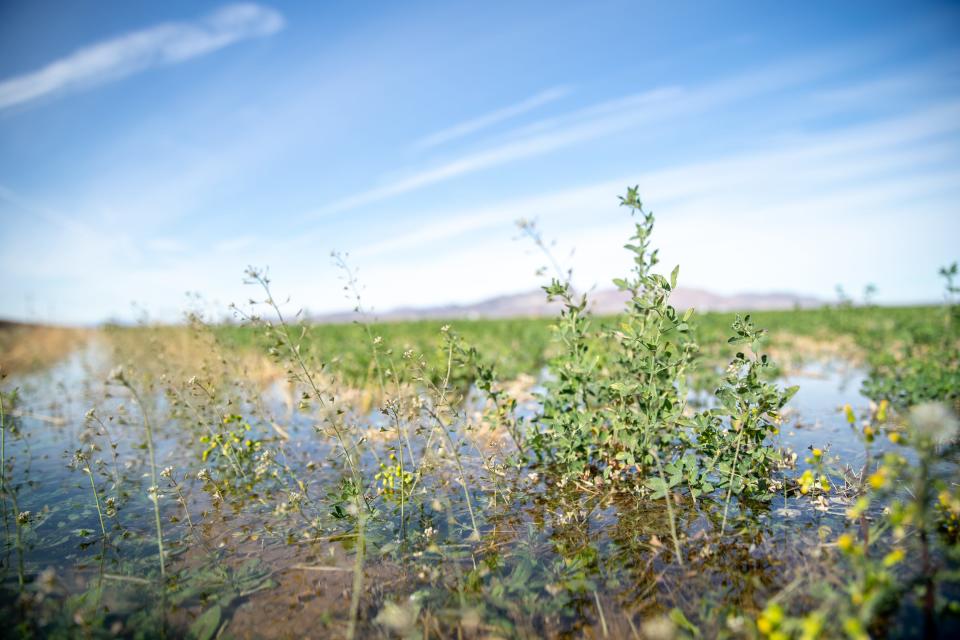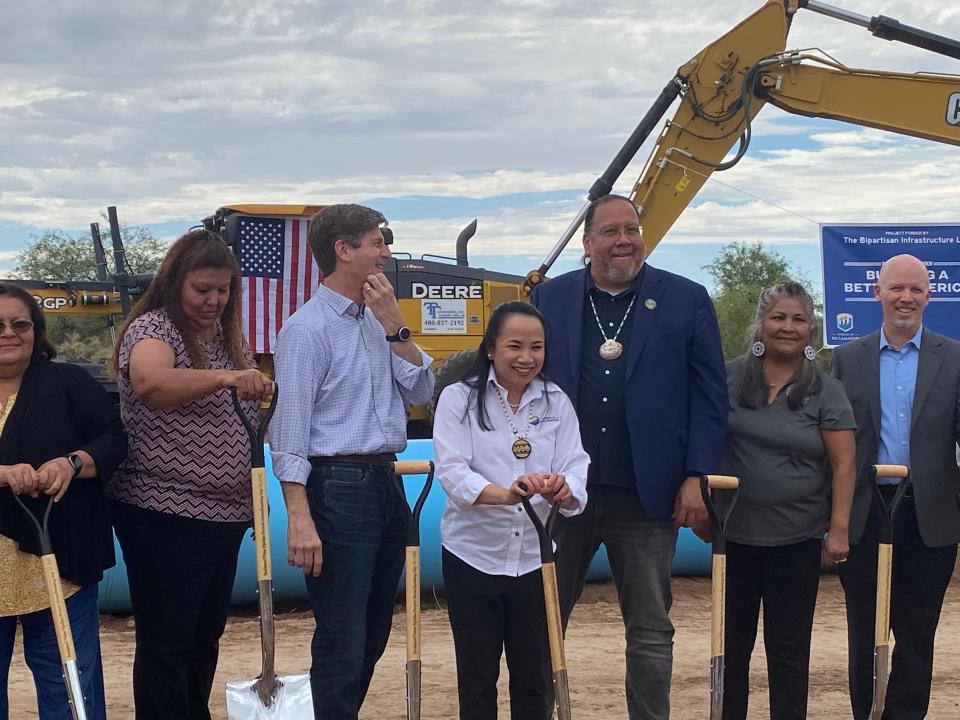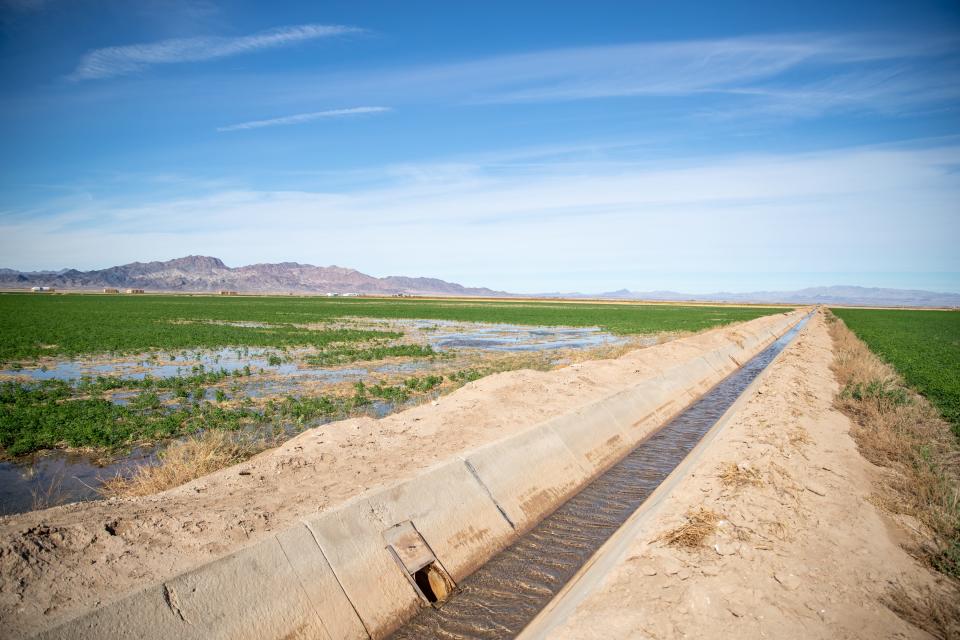Tribes seek equal status in Colorado River talks, compensation for any forced cuts
Two-thirds of the tribes with lands and water rights in the Colorado River Basin are calling for equal status in developing new river management guidelines and protection of their senior water rights against proposed cuts or caps on developing their water.
Leaders from 20 tribes, including eight in Arizona, sent a letter to the U.S. Bureau of Reclamation March 11. In the letter, obtained by The Arizona Republic, the tribes outlined what they expect in new river management guidelines that will take effect when the current guidelines expire Dec. 31, 2026.
The two tribes with Arizona's largest river allocations — the Colorado River Indian Tribes, which holds senior rights to 720,000 acre-feet of water, mostly in Arizona, and the Gila River Indian Community, with 653,000 acre-feet of Colorado River and other waters — did not sign the letter.
The Gila River Indian Community opposed a plan offered by the three Lower Basin states and said it would issue an alternative plan, which it has not yet released. The tribe said it could walk away from a plan if it is not satisfied. The letter from the other tribes did not include a similar ultimatum.
"Basin tribes have long faced systemic barriers to developing and benefiting from their water rights," the group said. Tribes have until recently been largely left out of Colorado River management planning, even though they hold senior rights to at least 20% of the river. In Arizona, that number is closer to 40%.
The Colorado River Compact, enacted in 1922, barely mentioned tribes' rights to water. The 2007 guidelines left tribes out almost entirely, the group said.
Tribes stepped forward with voluntary reductions to ease the strain on the river and participated in talks to develop the Drought Contingency Plan, which addressed a historic drought that disrupted the 2007 guidelines that were designed for a 20-year span.
Since then, they have advocated for a greater, more equal role in creating the new management protocols.
There has been some movement toward more tribal participation. Tribes are represented in the Arizona Governor's Water Policy Council, and Quechan President Jordan D. Joaquin is the first-ever Native member of the the Colorado River Board of California.
Water resources: Hobbs rejects Republican groundwater bill, says rural Arizona needs a better plan
Tribes' letter outlines three principles
The tribal leaders presented three key principles they expect the administration to abide by when developing river management protocols. They said the U.S. must:
Uphold its trust responsibility to the basin tribes by protecting Indian tribal water rights whether or not they have been quantified.
Create and support an array of tools to give tribes flexibility in how and when they use their water rights.
Provide a permanent, formalized structure for tribal participation in implementing the new Colorado River management guidelines during the current negotiations and in any future river policy and governance.
Among other points, the tribes said Reclamation must reject any plan that would force the five Colorado River Valley tribes, four of which have lands and water rights in Arizona, to accept involuntary or uncompensated reductions. Those tribes' rights were affirmed in the case Arizona vs. California and are among the tribes with the oldest affirmed rights, dating back to the mid-19th century.
Leaders said those tribes, as well as tribes who receive their allocations through the Central Arizona Project Canal, should receive alternative water supplies if their water rights usage is disrupted by the new guidelines.
Tribes should also have the right to lease or use water off their reservations, the group said.

The Ak-Chin Indian Community, which signed the letter, said since tribes hold some of the largest and most senior rights on the Colorado River, it was vital that they have a seat at the table as the Bureau of Reclamation develops the new river management framework.
"Though tribes, including Ak-Chin, have too often in the past been left out of important decisions that impact our people, we have seen more recently that tribal involvement leads to better and more creative solutions," said Ak-Chin Chairman Robert Miguel.
He urged the Biden administration to continue to include tribes in management discussions. "We urge that this continue and tribal water rights be recognized and upheld throughout this process.”
Ak-Chin has experienced issues with water quality in the water it gets from a CAP canal after Pinal County farmers used it to convey more brackish groundwater after their river allocations were cut in the first round of reductions.
Two biggest water rights holders in Arizona didn't sign, but still want to protect their water

During a water conference at the University of Arizona March 13, Gila River Governor Stephen Roe Lewis said his 20,000-member tribe had demonstrated its commitment through the years, saving 910,000 acre-feet to date, and has committed to more. This has been done in bipartisan fashion, he said, and the tribe has a strong relationship with Arizona Gov. Katie Hobbs and the Arizona Department of Water Resources.
“We will need our allies to stand with us in the difficult months and years ahead,” he said.
The Arizona Department of Water Resources declined comment on the tribes' letter.
Lewis, who serves on the Governor's Water Policy Council with three other tribes and the Inter Tribal Council of Arizona, said he applauds the Lower Basin states for seeking consensus, but that consensus must fit with Gila River's principles, developed during the Drought Contingency Plan talks.
Reiterating the demands in the 20 tribes' letter, he said the burden of cuts must be fair and equitable across the states and user groups, and that any cuts to tribal water must be accompanied by a fair replacement, either of monetary compensation or replacement water from another source.
If that doesn’t happen, he said, “the community will stand firm and oppose it.”
Gila River has identified an alternative source of water and is talking to the Bureau of Reclamation about it, he said. The community remains committed to finding consensus and will offer a plan that fairly imposes sacrifice on all without violating their principles.
Lewis later told reporters that the management plan presented by the three Lower Basin states involves deep cuts at the lower levels of reservoir storage, which the river seems likely to reach. Parceling out those cuts among all users puts an unfair burden on tribes. “It opens them up to tremendous cuts.”

Lewis also told reporters that the alternative water he noted in his speech involved storing water in the aquifer at Butler Valley, where it could be retrieved and sent through the CAP canal system, but he did not offer more details.
He added that he doesn’t believe the Lower Basin plan meaningfully accounts for evaporation. If it did, it would likely impose more cuts on California, making some level of tribal cuts unnecessary Lewis said.
“Water should never be taken (from tribes) through cuts unilaterally. There needs to be either mitigation or a source of replacement water.” Asked what he meant by mitigation, he said money.
Asked whether he thought the federal government could afford to continue the current payments for conservation indefinitely, he said he’s not looking for that, and would prefer “sustainability,” which will come from investments such as what Gila River has done by lining canals and shading them with solar panels.
Tribes and water: Their pleas for water were long ignored. Now tribes are gaining a voice on the Colorado River
'We're at the beginning, not the end'
Acting Deputy Secretary of Interior Laura Daniel-Davis acknowledged during a press call earlier in March that tribes in the basin have long-standing rights to water that the administration must honor and uphold. She said Interior initiated the first-ever federal-state-tribal partnership to ensure that tribes have a seat at the table at the beginning of developing the new river management guidelines.
Reclamation will begin work on the draft environmental impact statement for the new guidelines this month. "We're at the beginning, not the end, of the alternative development phase and will continue to work with all parties throughout the spring and summer to achieve as much consensus as possible," Daniel-Davis said.
The administration expect to publish the draft EIS by the end of 2024.
She said the public process can be slow-moving but will include all parties including the best available science and Indigenous knowledge.
"This is especially true in our work with tribal governments and communities who are indispensable partners in our work to address the climate crisis," she said.
"We're undertaking this process because failure is not an option."
Republic environmental reporter Brandon Loomis contributed to this story.
Debra Krol reports on Indigenous communities at the confluence of climate, culture and commerce in Arizona and the Intermountain West. Reach Krol at debra.krol@azcentral.com. Follow her on X, formerly known as Twitter, @debkrol.
Coverage of Indigenous issues at the intersection of climate, culture and commerce is supported by the Catena Foundation.
My articles are free to read, but your subscriptions support more great reporting. Please consider subscribing today.
This article originally appeared on Arizona Republic: Tribes demand equal status in negotiating Colorado River management

